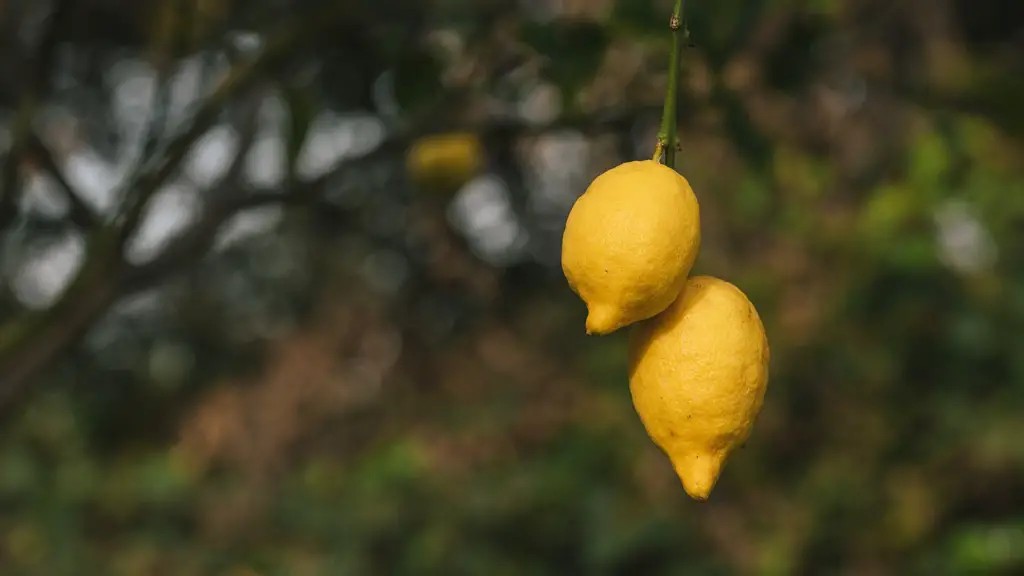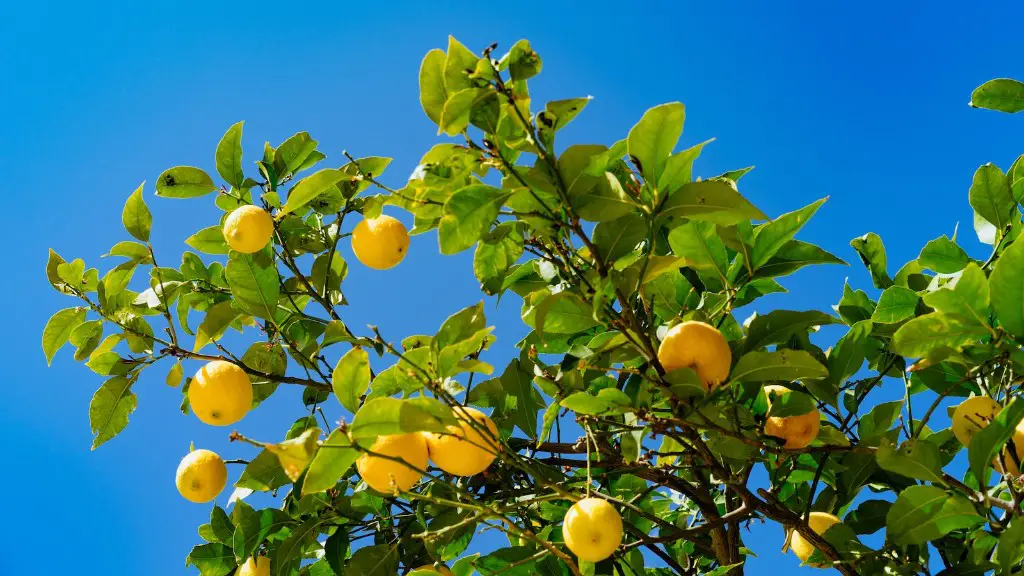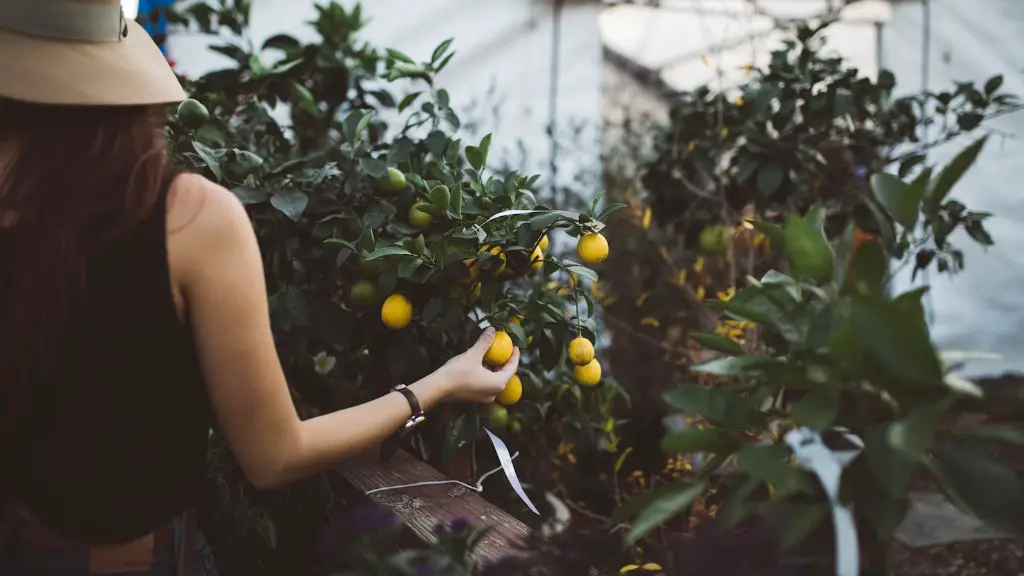A lemon tree is a common evergreen tree found in many warm climates. To ensure that it maintains its healthy growth, it must be watered regularly. But how frequent should you water a lemon tree, and how much should you water it?
The amount and frequency of watering required to keep a lemon tree healthy depends on the climate it is being grown in, the type of soil it is planted in, and how much sun it receives. In general, young lemon trees need to be watered more often than mature trees. In most climates, mature lemon trees should be watered every 10 to 14 days during the summer months and every 3 to 4 weeks during the winter.
When watering a lemon tree, it is important to deep-water it, which can be accomplished by slowly dripping water at the base of the tree for about one hour. This allows the water to penetrate the soil better, thus saturating the root system more effectively. Apart from deep-watering once every 10 to 14 days, a lemon tree can also be lightly misted with water several times a week.
It’s important to note that over-watering a lemon tree can be as detrimental as under-watering it. Too much water will cause the roots to rot, leading to a loss of nutrients and weakening of the tree’s overall health. To make sure you don’t over-water it, be sure to check the soil before each watering to make sure it’s not overly damp.
In areas that receive high amounts of rainfall, the frequency of watering can be adjusted accordingly. It’s also important to note that if you water too much, it may lead to the lemons being overly acidic. As a general rule, if you stick to deep-watering your lemon tree every 10 to 14 days, you should have healthy, juicy, and delicious lemons.
Climate and Watering Frequency
The climate in which you grow your lemon tree will have an impact on its watering frequency. For example, if you live in a hotter area, then your lemon tree will need to be watered more often than a tree grown in a cooler climate. This is because the hotter the temperature, the faster the soil will dry out, thus requiring more water to keep the lemon tree hydrated. Furthermore, the amount of rainfall your area receives will also affect the frequency of watering.
If you live in a dry and arid climate, then you may need to water your lemon tree more often than in areas that receive frequent rain showers. In these conditions, it is important to check the soil every few days and adjust the watering frequency as needed. For example, if the soil feels dry, then you may need to water the tree more often until the soil is damp enough to keep the roots hydrated.
Ideally, you should try to stay away from too much variety in the watering, as it can confuse the root system and cause it to become weaker. A lemon tree needs a consistent watering schedule and a regular supply of water to stay healthy and produce delicious lemons.
Soil Quality and Watering Frequency
The type of soil in which a lemon tree is planted can also affect its watering frequency. If the soil is of low quality, then it will be harder for the water to penetrate the roots, meaning that it will need to be watered more often. On the other hand, if the soil is of good quality, then water will be able to reach the roots more easily, thus allowing the tree to remain hydrated with less water.
It is also important to consider the drainage of the soil when watering a lemon tree, as the water must be able to flow freely away from the root system. If the soil is too water-logged, then the roots may rot, leading to a weakened root system, poor health, and decreased crop production.
For optimal results, the soil should be well-drained, rich in organic material, and kept consistently damp. It is also recommended to mix in some potting mix with the soil to help maintain the necessary moisture levels. Deep-watering your lemon tree every 10-14 days should provide enough moisture for the tree if the soil type and drainage are sufficient.
Watering Tips and Mistakes to Avoid
When watering a lemon tree, it is important to never over-water or underwater it. As the roots are very sensitive and can easily become damaged if the tree receives too much or too little water. Therefore, it is important to check the soil before each watering and adjust the schedule as needed.
In addition to careful observation, there are several other tips to keep in mind when watering a lemon tree. It is best to use non-chlorinated water, as chlorine can damage the delicate root system of the lemon tree. Additionally, you should avoid using a hose, as it can spray a large amount of water onto the roots, causing them to become water-logged. Lastly, try to avoid using sprinklers, as they can cause the soil to become too wet and make it harder for the water to penetrate the root system.
Wet-Dry Cycle and Watering Frequency
Besides the climate, soil type and quality, the frequency of watering a lemon tree will also depend on the wet-dry cycle it undergoes. If the soil becomes too wet and doesn’t have enough time to dry out between waterings, then the tree’s root system will be weakened and less likely to absorb the necessary nutrients. This is why it is important to check the soil before each watering and make sure it has had sufficient time to dry out.
In addition to checking the soil, it is also important to pay attention to the physical appearance of the lemon tree. If the leaves start to wither or yellow, then it may indicate that the tree is either suffering from under-watering or over-watering. If this is the case, then it is important to adjust the watering schedule as needed.
Soil pH and Watering Frequency
When watering a lemon tree, the pH of the soil should be taken into consideration. Ideally, the soil should be slightly acidic, with a pH of 6-7. If the soil’s pH is too high or too low, then it can affect the health of the tree, as well as the flavor and texture of the lemons. Therefore, it is important to regularly check the soil’s pH and adjust the watering schedule as needed.
Additionally, if the soil becomes too acidic due to over-watering, then it may lead to lemons that are overly sour. Therefore, it is important to not over-water the tree and try to stick to a schedule of deep-watering every 10 to 14 days. By following these tips, you should be able to keep your lemon tree healthy and hydrated, with delicious lemons produced year-round.
Nutrient Content and Watering Frequency
The soil in which the lemon tree is planted should also contain sufficient amounts of nutrients in order for the tree to receive the optimal amount of nourishment it needs. The soil should be rich in nitrogen and other essential elements which help to support the lemon tree’s growth and health. Without these nutrients, the tree will not be able to receive the necessary energy it requires to produce delicious lemons.
In addition to organic matter in the soil, the lemon tree should also be regularly fertilized in order to maintain its nutritional balance. When applying fertilizer, it is important to apply it at the base of the tree and avoid pouring it onto the leaves or branches as it can damage the tree. Additionally, when fertilizing a lemon tree, it is important to ensure that the soil is sufficiently moist. If the soil is too dry, then the fertilizer will not be able to penetrate the soil and feed the roots.
By taking into consideration the climate, soil type, quality, nutrient content, and pH of the soil, you should be able to develop a watering schedule that is suitable for your lemon tree. With the proper watering schedule and other essential care, your lemon tree will remain healthy and will produce delicious, juicy lemons.



